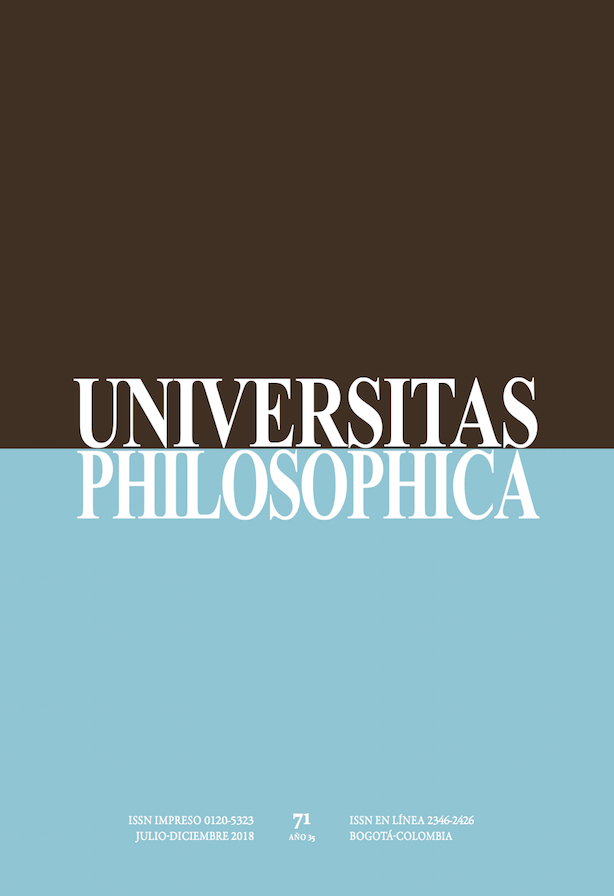Abstract
One of the minor works that has been immortalized and remains amongst the most cited essays in the history of philosophy courses is the 1874 publication entitled: An Answer to the Question: “What is Enlightenment”? by the German philosopher Immanuel Kant. We propose an hermeneutics of the main topics and problems that Kant addresses in this fundamental text; in addition, we will connect its arguments with the thesis that will be supported in this work: namely, that modern philosophy is an exercise of critical thinking that has implications on the educational views, as well as on the ethical and political bets that aim at finding solutions for a society that has been historically traversed by an armed conflict (as has been the case in Colombia), in a complex scenario where economic crises and asymmetric and fratricidal confrontations have been used, in conventional and unconventional ways, to obtain political power.
Cortina, A. (2003). La ética discursiva. En: Historia de la ética (Vol. 3). La ética contemporánea (pp. 533-579). Barcelona: Crítica.
Cruz Rodríguez, E. (2016). Fuerza pública, negociaciones de paz y posacuerdo en Colombia. Bogotá: Ediciones Desde abajo.
De Zubiría, S. (2015). Dimensiones políticas y culturales en el conflicto colom- biano. En: Contribución al entendimiento del conflicto armado en Colombia (pp. 197-246) [Informe de la Comisión Histórica del Conflicto y sus Vícti-
mas]. Bogotá: Ediciones Desde Abajo.
Foucault, M. (2009). El gobierno de sí y de los otros. México: Fondo de Cultura Económica.
Giraldo Moreno, J. (S.J). (2015). Aportes sobre el origen del conflicto armado en Colombia, su persistencia y sus impactos. En: Contribución al entendimiento del conflicto armado en Colombia (pp. 423-467) [Informe de la Comisión Histórica del Conflicto y sus Víctimas]. Bogotá: Ediciones Desde abajo.
Guzmán, Campos, Germán; Fals, Borda, Orlando y Umaña Luna Eduardo (2014). La violencia en Colombia. II Volúmenes. Colombia: Prisa ediciones.
Habermas, J. (1990). Pensamiento postmetafísico. México: Taurus.
Habermas, J. (2008a). Ética del discurso. Notas para un programa sobre su fun- damentación. En: Conciencia moral y acción comunicativa (pp.53-119). Madrid: Trotta.
Habermas, J. (2008b). La filosofía como comodín e intérprete. En: Conciencia moral y acción comunicativa (pp. 13-29). Madrid: Trotta.
Hoyos Vásquez, G. (1986). Los intereses de la vida cotidiana y las ciencias (Kant, Husserl, Habermas). Bogotá: Universidad Nacional de Colombia.
Kant, I. (1999). Respuesta a la pregunta: ¿Qué es la ilustración? Barcelona: Tecnos.
Muguerza, J. (2000). Ciudadanía: individuo y comunidad (una aproximación desde la ética pública) [Suplemento 5. Retos pendientes en ética y política]. Contrastes: Revista Interdisciplinar de Filosofía, 5, 17-26.
Muguerza, J. (1991). ¿Una nueva aventura del barón de Münchhausen? (Visita a la comunidad de comunicación de Karl-Otto Apel). En: K. O. Apel, A. Cortina, J. de Zan, & D. Michelini. (Eds.). Ética comunicativa y democracia (pp. 132-163). Barcelona: Crítica.
Palacios, Marco. (1995). Entre la legitimidad y la violencia. Colombia 1875- 1994. Colombia: Grupo Editorial Norma.
Perea Restrepo, C. M. (2006, septiembre 1o). Guerras, memoria e historia. [Re- seña del libro Guerras, memoria e historia, de Gonzalo Sánchez]. Análisis Político, 19(58), 166-173.
Sánchez , G. (2006). Guerras, memoria e historia. Bogotá: Instituto de Estudios Políticos y Relaciones Internacionales (IEPRI), Universidad Nacional de Colombia-La Carreta Editores.
Taylor, C. (2014). La era secular (Tomo I). Barcelona: Gedisa.
Thiebaut, C. (2003). La escuela de Frankfurt. En: Historia de la ética (Vol. 3). La ética contemporánea (pp. 441-480). Barcelona: Crítica.
Zuleta. E. (2003). La violencia política en Colombia. En: Colombia: violencia, democracia y derechos humanos (pp. 119-133). Medellín: Hombre Nuevo Editores -Fundación Estanislao Zuleta.
This journal is registered under a Creative Commons Attribution 4.0 International Public License. Thus, this work may be reproduced, distributed, and publicly shared in digital format, as long as the names of the authors and Pontificia Universidad Javeriana are acknowledged. Others are allowed to quote, adapt, transform, auto-archive, republish, and create based on this material, for any purpose (even commercial ones), provided the authorship is duly acknowledged, a link to the original work is provided, and it is specified if changes have been made. Pontificia Universidad Javeriana does not hold the rights of published works and the authors are solely responsible for the contents of their works; they keep the moral, intellectual, privacy, and publicity rights.
Approving the intervention of the work (review, copy-editing, translation, layout) and the following outreach, are granted through an use license and not through an assignment of rights. This means the journal and Pontificia Universidad Javeriana cannot be held responsible for any ethical malpractice by the authors. As a consequence of the protection granted by the use license, the journal is not required to publish recantations or modify information already published, unless the errata stems from the editorial management process. Publishing contents in this journal does not generate royalties for contributors.


